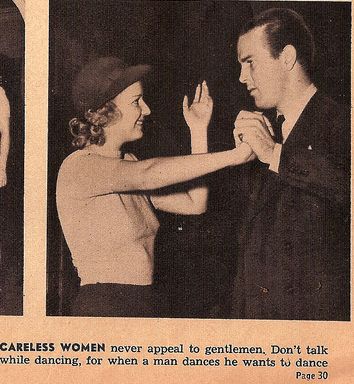So apparently, the vast, slowly capsizing shambles that is the Yahoo online empire has a dating and personals section.
I suppose I should have guessed that Yahoo has a dating and personals section. Everyone has a dating and personals section. The Onion has a dating and personals section. Hell, the Web site for the Southern Baptist Convention probably has a dating and personals section, though frankly I can’t be arsed to look, and it’d probably make my eyes bleed if it does.
The Yahoo dating and personals site recently ran an article that’s totally a testament to Yahoo as a whole, in a gruesome kind of way. The article is 10 things a good boyfriend won’t ask you to do, and boy, is it a doozy.
 Among the gems on this list of things you must never ask your girlfriend to do are things like #4, “Make him a sandwich,” or #5, “Change your relationship status on Facebook,” or my own personal favorite, #10, “Grow our hair long.”
Among the gems on this list of things you must never ask your girlfriend to do are things like #4, “Make him a sandwich,” or #5, “Change your relationship status on Facebook,” or my own personal favorite, #10, “Grow our hair long.”
And it seems to me that if these are the worst trials you ever face in your relationship life, then you’re doing pretty damn well.
I am firmly of the belief that it’s always OK to ask your partner for anything you want; indeed, I think that a whole lot of people might be a whole lot happier, and a whole lot of unnecessary suffering and angst might be avoided, if folks actually spent more time asking for the things they wanted and wouldn’t be so damn scared of doing it.
But I can kinda see where the article is coming from. The people who wrote it are making an assumption, and I bet it’s probably a fairly common one, that poisons and distorts their perceptions of what it is and is not OK to ask for.
It’s perfectly OK to ask your partner to make you a sandwich, or cut your hair, or even have a mad passionate kinky threesome with the captain of the Brazilian women’s volleyball team, provided that you don’t have an expectation that the answer must be “yes.”
And that is an important distinction, i think.
 Expectation will fuck you up.
Expectation will fuck you up.
If the Yahoo article had been titled “10 Things Your Boyfriend Shouldn’t Expect You To Do Just Because He Wants You To Do Them,” I wouldn’t have any complaints about it.
Now, before I keep going, I want to pause a minute and say that I don’t think that all expectations are necessarily wrong. There are many expectations that seem reasonable and healthy to me. I expect that my friends won’t punch me in the nose without provocation, steal my car, pee on my cat, or set fire to my sofa. I have an expectation that my romantic partners won’t drain my bank account and spend all the money on Mexican hookers and cheap booze.
And in a more general level, I find that life is a lot happier when I keep my expectations positive. I expect to be surrounded by love and intimacy; I expect the world to be filled with joy and abundance; I expect to be able to succeed at things I apply myself to.
So not all expectation is bad.
But still…
A couple of weeks ago, I was talking with a friend at a poly get-together about what factors make someone successful in finding relationship partners.
 His approach, he said, was not to approach anyone he found interesting, out of concern for how she might interpret it. He was worried about coming across as that creepy guy…you know the one I mean, the overbearing guy who stomps all over boundaries with heavy cast-iron boots, the guy who at best makes women cringe when he’s around and at worst radiates off stalker vibes for forty aces around him wherever he goes.
His approach, he said, was not to approach anyone he found interesting, out of concern for how she might interpret it. He was worried about coming across as that creepy guy…you know the one I mean, the overbearing guy who stomps all over boundaries with heavy cast-iron boots, the guy who at best makes women cringe when he’s around and at worst radiates off stalker vibes for forty aces around him wherever he goes.
And that got me to thinking. Because when I find someone interesting and shiny, when someone catches my eye (or, occasionally, the back part of my brain) and makes me sit up and take notice, I generally say so. Even if that person is, say, a cute, smart server at a Pizza Hut who, when asked to define the word “orgy,” thinks about it for a while and then says that while an orgy in its simplest form is just a bunch of people all having sex in the same room, for her it carries connotations of cross-couple sex.
But I digress.
Anyway, I tend to be very open with people I find interesting; if I have a bit of a crush on someone, I’ll say “Hey, you’re pretty cool! I think I have a bit of a crush on you.” And I can’t really recall having a bad response to that.
So that got me to thinking about why it is that some people who do this seem to come across as creepy, and get negative reactions; and some people who do this don’t come across as creepy, and get positive reactions. I’ve been chewing on this for weeks, and talking to people about it, and I think that a lot of it comes down to expectation.
Now, not ALL of it is about expectation. I was talking about this with seinneann-ceoil while she was in Portland visiting me last week, and her take on it is that a lot of how people react comes down to matters of attitude and confidence.
 I actually met seinneann-ceoil in person for the first time when I was in Orlando after DragonCon/ We’d been talking online, and joreth and I had an opportunity to meet up with her in a coffee shop at a bookstore for a while. We talked for an hour or two, and about twenty minutes in I realized that she had that certain spark I really look for–smart, strong-willed, eloquent, able to take a position on something important to her and talk about it passionately. So as we were leaving, I told her, “You know, I think I have a crush on you. I really dig you and I’d love to stay in touch if that’s something you might like.” We stayed in touch, it was something both of us liked very much indeed (oh, yes, we did), and she came up to visit last week.
I actually met seinneann-ceoil in person for the first time when I was in Orlando after DragonCon/ We’d been talking online, and joreth and I had an opportunity to meet up with her in a coffee shop at a bookstore for a while. We talked for an hour or two, and about twenty minutes in I realized that she had that certain spark I really look for–smart, strong-willed, eloquent, able to take a position on something important to her and talk about it passionately. So as we were leaving, I told her, “You know, I think I have a crush on you. I really dig you and I’d love to stay in touch if that’s something you might like.” We stayed in touch, it was something both of us liked very much indeed (oh, yes, we did), and she came up to visit last week.
I believe that had I not said anything, we might have had an interesting couple of hours, talked for a while, gone our separate ways, and that would’ve been it. There is something to the idea that confidence is important; in fact, I talk about that so often in this journal that it’s nothing you all haven’t heard before.
Attitude is important too, no doubt about it. seinneann-ceoil says that there’s a huge difference between a person who feels attracted to someone and responds with joy (“Hey, here’s a cool person I feel I connect with, isn’t that awesome? I can’t wait to see if that person feels the same way about me, and we can see if there’s something the two of us can explore!”) versus someone who responds with trepidation (“I feel this connection with this person…what do I do? What if she doesn’t like me? What do I say? Should I say anything? Man, this really sucks!”). Treating other people as a source of wonder and opportunity is likely to be more successful than treating other people with fear and hesitancy.
And I totally, 100% agree with all of that. But it still seems like there’s a piece missing, and I think that piece is in the expectations we attach to other people when we tell them we fancy them.
 Shelly feels, and I agree, that people who say things like “I like you” or “I have a crush on you” often attach an implicit, unspoken expectation to the end of it: “…and I want you to do something about that, and I’ll be upset if my expectation isn’t met.” Even though it’s not said, that tacit expectation hangs in the air, tangible to the person hearing the “I have a crush on you,” and it creates discomfort.
Shelly feels, and I agree, that people who say things like “I like you” or “I have a crush on you” often attach an implicit, unspoken expectation to the end of it: “…and I want you to do something about that, and I’ll be upset if my expectation isn’t met.” Even though it’s not said, that tacit expectation hangs in the air, tangible to the person hearing the “I have a crush on you,” and it creates discomfort.
She also says that that expectation gives no room for reciprocal interest; the expectation is that the person who hears “I have a crush on you” will return the feeling, regardless of whether or not it’s true.
And, most interestingly I think, she believes that when a person is attracted to someone because of some trait (beauty, say) that doesn’t make it easy to gauge reciprocity, the tacit expectation becomes even more uncomfortable. If two people talk for a couple of hours, it’s usually pretty simple to tell whether or not there’s any reciprocal interest at all; when one person spots a pretty young something something from across the room, it’s not.
Regardless of how the connection forms or whether or not it’s reciprocated, though, it seems that there is a clear difference between someone who says “I have a crush on you” with an unspoken “…and now I expect you to do something about it” and someone who doesn’t. As Zen as it sounds, if that expectation is there, it leaks out.
People don’t much cotton to having expectations imposed on them without their consent, it seems.
So a key ingredient to approaching people and expressing interest is to do it without the assumption that interest on your part constitutes an obligation on their part. I don’t know any way to fake that; in fact, I’m not even entirely sure exactly how unspoken expectations get communicated, but they do.
So, going back to the subject of reasonable and unreasonable expectations, it seems to me that expectations fall into one of three broad camps. There’s expectations we place on other people, expectations we place on the world at large, and expectations we place on ourselves. Any of the three can be positive or destructive.
For example, placing expectations on people simply because we like them is probably not cool, though expecting other people to treat us with a certain measure of respect as reasonable adults seems healthy and positive to me. “I expect that you will be fairly decent to me and not punch me in the nose without provocation” is probably good; “I expect that you will go out with me because I think your pretty” is probably bad.
Similarly, “I expect that I will be surrounded with opportunities for joy” is probably a healthy way to engage the world, at least for those of us not born in North Korean forced labor camps. (If that sounds like it’s coming from a place of privilege, it probably is, but not necessarily in the ways that you might think; studies have shown that people living in poor Third World countries like Nigeria are often happier than people living in First World countries, so the opportunities for joy are not necessarily available only to the wealthiest. That’s probably a topic for its own essay, though.) “I expect that I will have everything I want” is probably not so good.
When it comes to the expectations we place on ourselves, “I expect to be able to do well at the things that I work at” is, it seems to me, a positive and healthy thing. “I expect to be able to understand my own emotions and to be able to behave reasonably even when i am experiencing stress” also seems reasonable to me. “I expect to fail at everything I do” is probably not so good; and, on the flip side of the same coin, “I expect to succeed at everything I try the first time I try it” is probably not so good either. “I expect that I will never feel any negative emotion, and that if I do, I am a failure” is a particularly insidious and toxic one.
I’ve written before about why I am not a Buddhist, in that I think detaching one’s self from all desire and all expectation can make for passivity. But I think there’s something to the notion of detachment from expectation, at least from expectation that is unrealistic, imposes an unasked-for and non-consensual burden on others, or both.
And I think that once you’ve done that, telling someone you fancy “hey, I fancy you” has entirely different results.
Like this:
Like Loading...




 Game changing relationships cause people to pull up stakes and move to the other side of the country. They make people do things they never thought they’d do: die-hard opponents of marriage might find themselves in wedlock, otherwise reasonable men could end up watching chick movies starring Sandra Bullock. They are unpredictable and chaotic, and when they happen things change.
Game changing relationships cause people to pull up stakes and move to the other side of the country. They make people do things they never thought they’d do: die-hard opponents of marriage might find themselves in wedlock, otherwise reasonable men could end up watching chick movies starring Sandra Bullock. They are unpredictable and chaotic, and when they happen things change. We all implicitly understand, at least on some level, that life is full of change, and sometimes that change isn’t what we asked for. We all understand that no promises of “forever” can really stand up to the #39 bus with bad brakes that careens through the front of the house and puts someone in a coma. These are the risks we take when we open our hearts to someone else; anyone who can’t take the risk shouldn’t play the game. Relationships aren’t for cowards or sissies.
We all implicitly understand, at least on some level, that life is full of change, and sometimes that change isn’t what we asked for. We all understand that no promises of “forever” can really stand up to the #39 bus with bad brakes that careens through the front of the house and puts someone in a coma. These are the risks we take when we open our hearts to someone else; anyone who can’t take the risk shouldn’t play the game. Relationships aren’t for cowards or sissies.


 Among the gems on this list of things you must never ask your girlfriend to do are things like #4, “Make him a sandwich,” or #5, “Change your relationship status on Facebook,” or my own personal favorite, #10, “Grow our hair long.”
Among the gems on this list of things you must never ask your girlfriend to do are things like #4, “Make him a sandwich,” or #5, “Change your relationship status on Facebook,” or my own personal favorite, #10, “Grow our hair long.” Expectation will fuck you up.
Expectation will fuck you up. His approach, he said, was not to approach anyone he found interesting, out of concern for how she might interpret it. He was worried about coming across as that creepy guy…you know the one I mean, the overbearing guy who stomps all over boundaries with heavy cast-iron boots, the guy who at best makes women cringe when he’s around and at worst radiates off stalker vibes for forty aces around him wherever he goes.
His approach, he said, was not to approach anyone he found interesting, out of concern for how she might interpret it. He was worried about coming across as that creepy guy…you know the one I mean, the overbearing guy who stomps all over boundaries with heavy cast-iron boots, the guy who at best makes women cringe when he’s around and at worst radiates off stalker vibes for forty aces around him wherever he goes. I actually met
I actually met  Shelly feels, and I agree, that people who say things like “I like you” or “I have a crush on you” often attach an implicit, unspoken expectation to the end of it: “…and I want you to do something about that, and I’ll be upset if my expectation isn’t met.” Even though it’s not said, that tacit expectation hangs in the air, tangible to the person hearing the “I have a crush on you,” and it creates discomfort.
Shelly feels, and I agree, that people who say things like “I like you” or “I have a crush on you” often attach an implicit, unspoken expectation to the end of it: “…and I want you to do something about that, and I’ll be upset if my expectation isn’t met.” Even though it’s not said, that tacit expectation hangs in the air, tangible to the person hearing the “I have a crush on you,” and it creates discomfort.